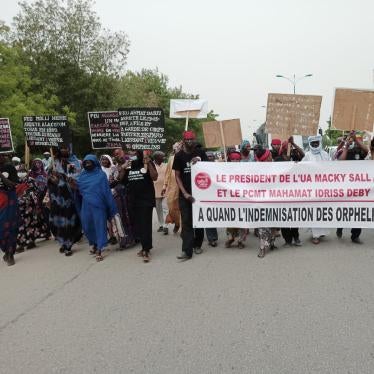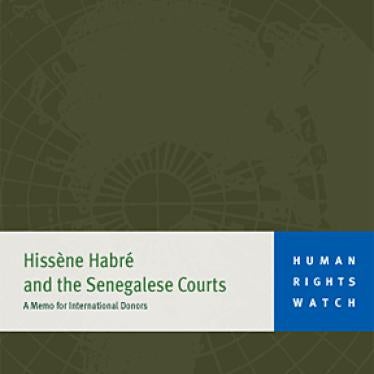(Dakar) – Fourteen abuse victims, backed by a coalition of African and international rights groups, today filed complaints with a Senegalese prosecutor accusing the former Chadian dictator Hissène Habré of crimes against humanity and torture.
The charges mark a new phase in the long-running effort to bring Habré to trial for atrocities committed during his 1982-1990 rule. Habré, who has lived in Senegal since he was deposed, was first indicted in Senegal in 2000, before courts ruled that he could not be tried there. Senegal then rebuffed a Belgian extradition request for Habré in 2005 before agreeing in July 2006 to an African Union request to prosecute Habré “on behalf of Africa.” In July 2008, Senegal completed a series of legal reforms and constitutional amendments removing the legal obstacles to Habré’s trial.
“We are asking Senegal finally to let us have our day in court,” said Clement Abaifouta, president of the Chadian Association of Victims of Political Repression and Crime (AVCRP), who as a prisoner was forced to dig graves for more than 500 fellow inmates. “This is our last hope. We have been fighting for 18 years to bring Habré to justice, and most of the survivors have already died.”
Under the Senegalese legal system, the prosecutor will now examine the victims' complaints, and decide whether to present formal charges against Habré before a team of investigating magistrates who have been named to deal with the case.
“We are confident that the prosecutor will now move forward and charge Hissène Habré with crimes against humanity,” said Demba Ciré Bathily, who coordinates the victims’ legal team in Senegal. “The evidence we presented today makes clear that Habré was not only politically responsible but also legally responsible for massive crimes.”
Two Senegalese victims and their families are represented in the case. Abdourahmane Gueye and Demba Gaye, Senegalese merchants, were arrested and jailed in Chad in 1987. Demba Gaye died in prison, while Abdourahmane Gueye was freed after seven months through the intervention of the Senegalese government.
Senegal has said that the investigation and trial of Habré will cost 28 million euros, and that it had budgeted over 1.5 million euros (1 billion francs CFA) for the trial. Chad has agreed to contribute 3 million euros (2 billion francs CFA). In January 2008, a European Union delegation and an African Union envoy visited Dakar to support a request by Senegal for financial and technical assistance.
“Thousands of Habré’s victims, indeed all the people of Chad, are with us today,” said Dobian Assingar, a Chadian activist with the International Federation of Human Rights. “No family in Chad was untouched by Habré’s crimes.”
The victims presented the court with thousands of documents of Habré’s political police, the DDS (Direction de la documentation et de la sécurité), which were discovered by Human Rights Watch in 2001. The documents detail how Habré placed the DDS under his direct authority and kept tight control over DDS operations. The documents contain the names of 1,208 persons who died in detention. In these files alone, there is evidence that Hissène Habré received 1,265 direct communications from the DDS about the status of 898 detainees. The victims also presented a 50-page statement from a top DDS official describing Habré’s relations with the DDS.
“The evidence shows that Habré was not a distant ruler who knew nothing about these crimes,” said Reed Brody, a lawyer at Human Rights Watch who has been working to bring Habré to justice since 1999. “Habré directed and controlled the police force which tortured those who opposed him or those who simply belonged to the wrong ethnic group.”
“My country must set an example for Africa by showing that Africans can take care of their own problems,” said Alioune Tine of the Dakar-based African Assembly for the Defense of Human Rights (RADDHO). “The time when brutal despots could just take their bank accounts and move next door has ended.”
In February 2007, Senegal passed legislation permitting it to prosecute cases of genocide, crimes against humanity, war crimes and torture, even when they are committed outside of Senegal. In July 2008, Senegal amended its constitution to make clear that the law applies to such crimes even when they were committed before the law was passed.
Other plaintiffs in the case today included Souleymane Guengueng, 58, who almost died of dengue fever during two years of mistreatment in Chadian prisons. Ginette Ngarbaye, 45, was arrested when she was pregnant and was tortured with electric shocks. She gave birth to her first child in a prison cell. Souleymane Abdoulaye Tahir, now 34, was only 15 when he was arrested and repeatedly tortured with electric shocks in an attempt to discover his cousin’s whereabouts.
Younous Mahadjir, 55, vice-president of the Chadian Labor confederation, and Boukar Aldoumngar Mbaidje, 60, were accused of distributing anti-Habré literature in 1990 and beaten in prison while their hands and feet were tightly bound together behind his back, a common torture known as the “Arbatachar.” The complaint cites DDS documents and the testimony of DDS officials that Habré ordered the crackdown on those involved. Several of those arrested, including one of Habré’s former advisors, state that Habré followed their interrogation and torture on a two-way radio, while Mbaidje was brought before Habré himself with the signs of torture still evident on his body.
“Its time to get this case moving,” said Jacqueline Moudeina, president of the Chadian Association for the Promotion and Defense of Human Rights, who is also a lawyer for the victims. “Senegal has let us down so many times. We appeal to our African brothers and sisters not to let us down again; it would be too cruel.”
In August, Hissène Habré and 11 Chadian rebel leaders were sentenced to death in absentia by a Chadian court for their alleged roles in attempting to overthrow the Chadian government in February 2008. Both the Chadian and Senegalese justice ministers have made clear that this conviction will not affect the case against Habré in Senegal.
Background
Hissène Habré ruled Chad from 1982 until he was deposed in 1990 by President Idriss Déby Itno and fled to Senegal. His one-party regime was marked by widespread atrocities, including waves of ethnic campaigns. Files of Habré’s political police, the DDS (Direction de la Documentation et de la Sécurité), which were discovered by Human Rights Watch in 2001, reveal the names of 1,208 persons who were killed or died in detention. A total of 12,321 victims of human rights violations were mentioned in the files.
Habré was first indicted in Senegal in 2000 before courts ruled that he could not be tried there. His victims then turned to Belgium and, after a four-year investigation, a Belgian judge in September 2005 charged Habré with crimes against humanity, war crimes, and torture.
Following a Belgian extradition request, Senegalese authorities arrested Habré in November 2005. The Senegalese government then asked the African Union to recommend how to try Habré. On July 2, 2006, the African Union, following the recommendation of a Committee of Eminent African Jurists, called on Senegal to prosecute Habré “in the name of Africa,” and Senegalese President Abdoulaye Wade declared that Dakar would do so.







